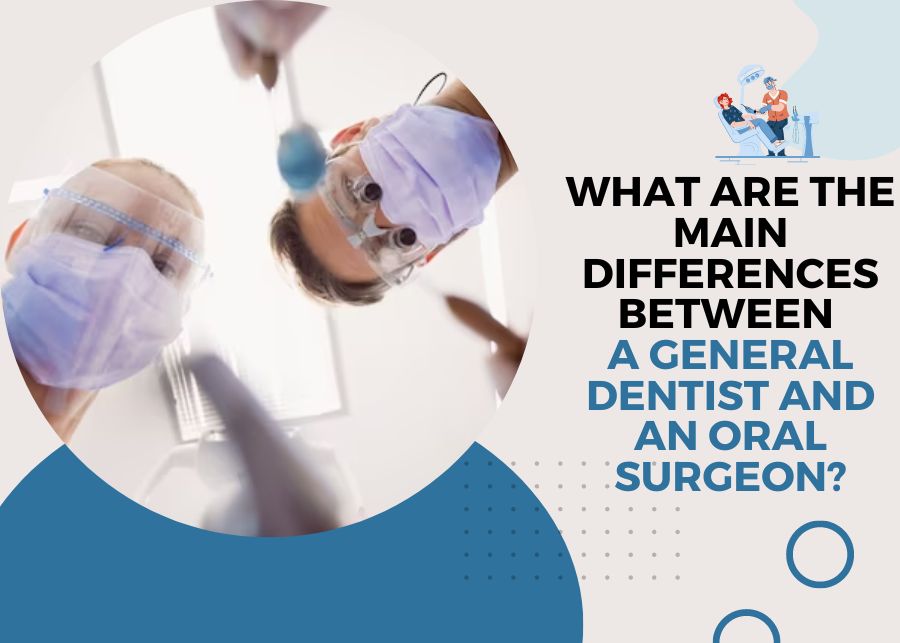Taking care of your oral health is important, and choosing the right dental professional is even more important. It’s natural to have concerns and questions about which dental professional to turn to for assistance.
Understanding the distinctions between an oral surgeon and a general dentist can help you make an informed decision that best addresses your oral health care needs.
Dentistry encompasses a wide range of specialties, with each dental condition requiring the expertise of a specific type of professional. By delving into the unique roles and capabilities of oral surgeons and general dentists, you can navigate the vast landscape of dentistry and make the right choice for your oral health concerns.
Firstly, we need to understand what a general dentist and an oral surgeon do.

General dentists provide primary dental care to patients of all ages and administer routine procedures for preventive and restorative oral healthcare. They commonly offer family dental services, specialized treatments, and regular cleanings and maintain a comprehensive record of their patients’ overall oral health.
A general dentist performs procedures focused on repairing damage caused by disease, trauma, or tooth decay, such as fillings, root canals, and crowns.
Oral surgeons are dental specialists who undergo an additional four to six years of education compared to general dentists. They specialize in addressing issues pertaining to the soft and hard tissues of the mouth, jaw, and face. Additionally, they have expertise in areas such as otolaryngology (ear, nose, and throat), anesthesiology, internal medicine, plastic surgery, and emergency medicine.
Their extensive knowledge and experience make them highly skilled in diagnosing and treating various conditions involving facial bones, including the jaw.

Education is the main difference between a general dentist and an oral surgeon.
The oral surgeon is the most qualified to perform complex dental implant procedures when compared to a periodontist and a general dentist, thanks to their rigorous training.
Oral surgeons’ training:
- Graduated from dental school.
- Completed 4-6 years of training in residency.
- Board-certified or board-eligible status.
Being board certified signifies a sense of confidence and competence. A surgeon can also be board-eligible, which means that they’re currently in the process of becoming certified. On the other hand, general dentists can be certified after a weekend course.
Another important detail to take into consideration is Experience.
While board certification demonstrates a successful track record, conducting research to obtain genuine feedback from previous patients is an excellent method to ensure you will receive excellent care. In many instances, you can request to speak with a former patient for further reassurance.
You might also want to know that only oral surgeons are licensed to have general anesthesia administered in their offices. This is both a wise and comfortable option for the patient when undergoing a complex dental procedure.
What Should I Ask at the First Appointment?

Being board-certified is the ultimate badge of confidence. However, it is still important to get to know all of the people who will be involved in your procedure. Here are some recommended questions that might be useful for you during your first appointment:
- Are you an oral surgeon or a dentist?
- Are you a board-certified oral surgeon?
- How long have you been performing this procedure?
- Could you connect me with a recent patient who can provide further information and answer additional questions about the procedure?
General dentists and oral surgeons belong to the same profession; however, they fulfill different roles and responsibilities. Making a choice between the two depends on the specific treatment needed. If the patient needs routine checkups or regular cleanings, it is advisable to visit a dentist. On the other hand, if the patient requires complex procedures, it is recommended to schedule an appointment with an oral surgeon.
In cases of oral health problems, it is crucial not to hesitate in seeking assistance from a general dentist. They can provide guidance and, if required, refer you to an oral surgeon for more specialized procedures. By working together, these professionals ensure that you receive the appropriate care and treatment for your specific oral health needs.
Our team of specialty dental experts is unparalleled in Fort Collins and in the Northern Colorado area.
At Northern Colorado Dental Specialty and Dental Implant Center, we are dedicated to getting your care right the first time so you can confidently enjoy your life.
Call +1 970-825-0000, or visit us at 1221 E Elizabeth St Unit 4, Fort Collins, CO 80524.


